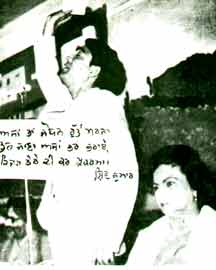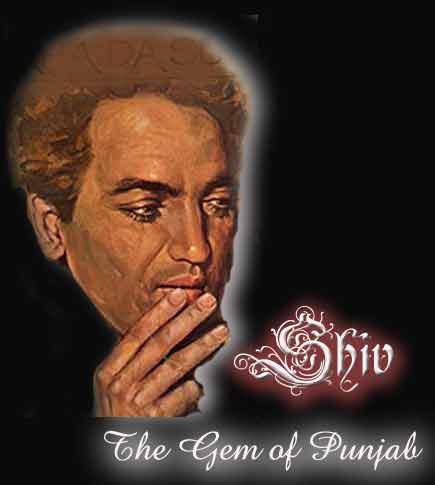

Shiv Kumar was a born poet who migrated from the poetic region of Sialkot
to Batala at the most miserable moment of human history. It was the Independence
of the sub-continent in 1947 - the dreadful, painful, horrible, miserable,
devastating, slaughtering and marauding phenomenon, which bisected the trouble
stricken North India. The pangs of separation are recurrent themes of this
great lyricist of the land. He has been hailed as one of the great poets of
all times.
Nevertheless, being acquainted with some of his poems, receding and bleeding
parting songs and prosodic commentary on the nearly dead ROMANTIC tradition
of the land of five rivers, Shiv Kumar has fostered the impression of sentimental
romance of the bygone era in the contemporary idiom. Spanning from the folk-stage
to the film screen, Shiv Kumar has re-established the heroic, romantic and
down to earth tradition of transcendental poetry.

I had an opportunity to see Shiv Kumar in the fifties when he sang his first song (the maiden song) 'Piran da Praga' at a kavi darbar in Jalandhar City's company bagh in 1955. I was perhaps the last recorder and listener of Shiv Kumar in England when he wrote down in one of my book - a poem on 'The Sun':-
'Charh Aa! Charh Aa! Charh Aa!
cVH Aw ! cVH Aw! cVH Aw [
DrqI qy DrqI-Dr Aw [
Aj swrw AMbr qyrw [
qYnUM rokx vwlw ikhVw?
I have adorned this poem since 1972 and I am proud of reproducing this great lyric written by the author in his own hand.
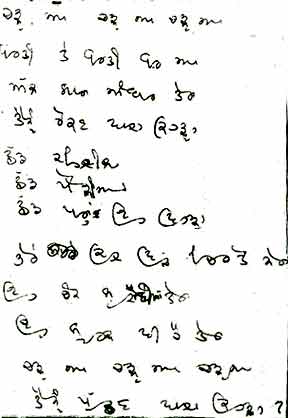
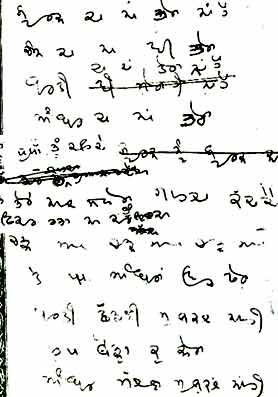
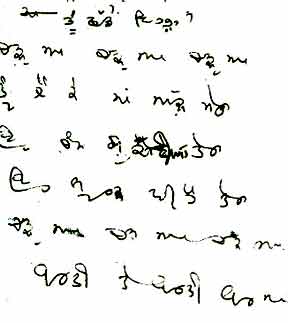

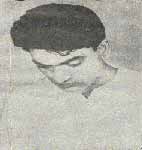
To my mind the 'Piran da Praga' and 'Charh Aa! Charh Aa!' were the first and last creations of this great gem of Punjabi poetry of the 20th century. I would like to elaborate this theme in the following words.
He listened with rep attention as an old sage. He learned from chat books
and broadside ballads. A boyhood visit to a Mela (folk festival) in the 'Majha'
broadened his experiences, revealing vistas stretching far beyond the confines
of his father's middle class situation. As he approached young manhood, however,
his prospects as either a 'Patwari' or a poet, seemed utterly drearier.
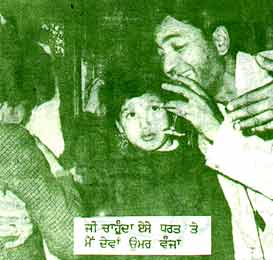
The Sun that rose early in the morning had to meet the sunset in the evening.
You blame the West - No the West did not kill the Sun.
The assassin is not an enemy
It is true my friend -
Shiv has been killed by his own dear friend.
He changed this verse thus:-
cMgw huMdw svwl nw krdw,
mYnUM qyrw jvwb lY bYTw [
It would have been better if I didn't ask any question or favour from you.
From you, the embodiment of grief, in the end, I received a reply as a 'No'.
Lost I am in your captivating beauty!
Now he began to create his own orbit within the exalted circles of the elite of the Punjab. He met the antiquarians who were interested in the preservation of old 'Baint Style' poetry and he made his happiest contact with the masses of the Punjab through the radio listeners and the stage.
Shiv Kumar Batalvi
Sh iv Kumar was born on July 23, 1936 in Bara Pind Lohtian (Shakargarh tehsil), in Punjab (now Pakistan). His father was a Patwari by the name of Pandit Krishan Gopal. After the partition his family moved to Batala. As a child Shiv is said to have been fascinated by birds and rugged, thorny plants on the Punjabi landscape. Shiv was exposed to the 'ramlila' at an early age, and it is to be expected that he received what was later to become his instinctive understanding of drama from these early performances.

Shiv passed his matriculate exams in 1953, from Punjab University. He went
on to enrol in the F.Sc. programme at Baring Union Christian College in Batala.
Before completing his degree he moved to S.N. College, Qadian into their Arts
program. It is here that he began to sing ghazals and songs for his classmates.
Shiv never gave the final exams he needed to pass to receive his degree.
Around this period, he met a girl named Maina at a fair in Baijnath. When
he went back to look for her in her hometown, he heard the news of her death
and wrote his elegy 'Maina'. This episode was to prefigure numerous other
partings that would serve as material to distil into poems. Perhaps the most
celebrated such episode is his fascination for Gurbaksh Singh's daughter who
left for the US and married someone else. When he heard of the birth of her
first child, Shiv wrote 'Main ek shikra yaar banaya', perhaps his most famous
love poem. It's said that when she had her second child, someone asked Shiv
whether he would write another poem. Shiv replied 'Have I become responsible
for her? Am I to write a poem on her every time she gives birth to a child?'
Sounds much better in Punjabi (main oda theka leya hoyaa? Oho bacche banayi
jave te main ode te kavita likhda rehma?).
In 1965 Shiv won the Sahitya Akademi award for his verse-drama Loona. He married
on Feb 5, 1967
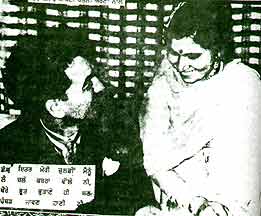 .
.
Shiv with his wife Aruna
His wife Aruna was a Brahmin from Kir Mangyal in district Gurdaspur.
By all accounts Shiv had a happy marriage. He had two children, Meharbaan
(b. Apr. 12, 1968) and Puja (b. Sep. 23, 1969) whom he loved immensely.
By 1968 he had moved to Chandigarh, but both Batala and Chandigarh became
soulless in his eyes. Chandigarh brought him fame, but scathing criticism
as well, Shiv replied with an article titled 'My hostile critics'. Meanwhile
his epilepsy got worse and he had a serious attack while at a store in Chandigarh's
section 22. In the early 70's Shiv came to Bombay for a literary conference.
In keeping with Shiv's outrageous behaviour there is a story about his trip
to Bombay as well. Part of the conference involved readings at Shanmukhananda
hall. After a few people had read their work (one of whom was Meena Kumari),
Shiv got on the stage and began "Almost everyone today has begun to consider
themselves a poet, each and every person off the streets is writing ghazals".
By the time he'd finished with his diatribe, there was not a sound in the
hall. This is when he began to read 'Ek kuri jeeda naam mohabbat. gum hai,
gum hai...'. There wasn't a sound when he finished either.
Shiv has been called a Bohemian. There were complaints about his drinking
and some suggestions that his 'friends' had him drink so he would exhibit
his outrageous self. Shiv Kumar died in the 36th year of his life on May 7,
1973 in his father-in-law's house at Kir Mangyal near Pathankot.
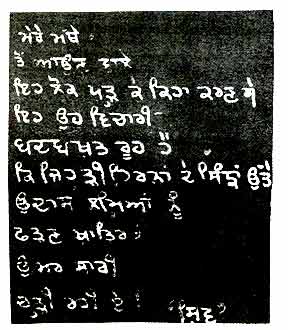
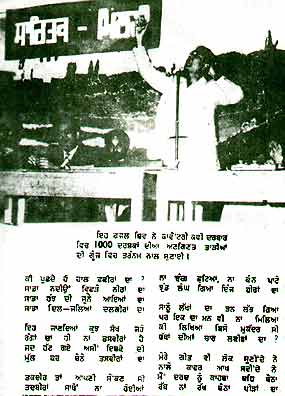
SHIV - AN INTRODUCTION
GOPAL PURI Liverpool
Shiv as the traditional poetical phenomenon was born out of the literary conjugation
(Kalmi sanjog) of Amrita Pritam and Mohan Singh, to whom he appropriately
dedicated his most important creation 'Briha too Sultan'. Both Amrita and
Mohan had personally suffered in their respective love lives on account of
circumstances beyond their control. In their romanticism therefore, a personal
tinge of desperation was in-evitable. Punjabi character is far more emotional,
both in happiness as well as sadness, than all other peoples' of the Indian
subcontinent. To succeed as a poet, therefore, one must succeed in making
people cry as well as bursting into hilarious laughter with the flow of the
lines. In contradiction to Amrita and Mohan, Shiv therefore, developed the
most superb art of recitation. He will be long remembered, like Heer Warris
Shah, for this emotional rendering of whatever he wrote. I was deeply impressed
by his exposition of this vivid magic in the very first Kavita that he gave
at our house - 'Ki puchde ho hal fakiran da'. This ren-dering has the touch
of Sehgal's voice - '])ukhh ke Aab din bitad nahin' Shiv like Sehgal had the
inborn gift of soul-touching expression. He needed words and lines and in
this he had the help of his creators more than anyone else past or present.
I feel that in her enthusiasm to present her 'poetic-child' to the world Amrita
herself became too emotional in giving an unnecessary notoriety to Shiv as
a heart-throwing lover (dil-pheank ashiq.). Any healthy child experiences
love-stings like Shiv and dreams love dreams like he did, but every child
cannot be a poet. In the lines that are attributed to this side of Shiv's
creation there is the show of an irksome mockery. Every effort had been made
to present him as a love-torn lover; as a half living, babbling corpse of
love's treachery. True to his creators he was expounding all his life a love-lost
theme, which was not, his own but was someone else's. He was never allowed
to grow up beyond this slippery, muddy stage of deception with alcohol and
tob5cco in his body and love-potions in his mind.
But Shiv violently protested against this utter subjugation. In his 'Main to Main' he says:-
'O mere sirjko
Tan de trashanhar butkaro
Tuhadi wansh wich hun bal nahin
1k swal jamna si
Jida uttar wi moran ton
Tusan sabna sen sangna si
Te jad men oodri thup nen
Mere jungle choun langna si
Taan bhuldi sabiyata men
Shaher de moran to khangna si
He had tried to find himself in his own self. Similar effort has been made again and again in 'Loona'. I feel sure that as time passes on people will try to find out more of the philosophy of his life butt at the occasion of the first national meeting that is being held in London to remember Shiv.
I wish to add my own appreciation of the man who came in our life only for
a few brief moments. I had not heard of him in India and met him for the first
time when I went to receive him at Heathrow. I was not aware of his poetry
either.
During all his stay in England I had never found him sober, but he was wonderful
to his onlookers, a joke to his critics, and an enigma to himself. What I
have written so far is the expression of a mixture of feelings that Shiv generated.
But he had something really unique in him which would have him a place of
pride among poets of the Punjab. He will be remembered long after his contemporaries
would be forgotten for having brought to the Punjabi Kavita a true expression
of the Punjabi cultural panorama.
Although he has written on a variety of themes, the main theme in Shiv's Poetry is Chet, Chandni, Joban rutan, Bhalke - nah - rehna. He writes
Phul di mahek mare
Par agg di mahek na mardi.
A flower does not die only its odour disappears
That is why he wished after death to become first a star and then a second choice a flower to pervade on the earth and sky, be here day or night. A shining star gives its odour in its twinkling - the fire of love. Shiv was himself a fiery person. His laughter was tinged with fire of inner grief and showed a perpetual depression - a fiery depression. He was depressed, is no doubt.
''Main niki umren sara dard banda baetha
eadi joban rat lahi dard kenwars hor deo'
In the parts of the Siwaliks there grow wild trees of har sangar (cyctanthes- arbor - tristis). The whole tree flowers around the early hours of the morning and fully grown white - dreamy - tinged with orange flowers fall down almost in rain before daybreak. It is a wonder-ful sight to see this spread of flowers, a massacre of youthful beauty. These are picked up, wovwn into garlands and tied around hair knots by young village lassies. Bushes of chamba and chambeli have also fully grown white creamy flowers that fall in the same way, but not so spectacularly. Chambe-di-kali flower buds are more commonly attributed to chamba. I am sure Shiv as a child must have been impressed by this dramatic death of the full grown youthful flowers, dying at the height of life. This became Shiv's ideal -
'Chambe da phul sajra naio tur paina'
He grieved to see the death of a Chamba flower -
Aj ik chambe da phul moea
Gal paona de pa ke bahin
Gora chetar chham chham roea
'Asaan te joban ruten marna
Mur jana asan bhare bharae
Hijer tere di kar prikarma.
These lines are a superb poetry as an example of delicate sensitivity in
expression. He filled sadness in the refreshing dew on the fallen flowers
- as chham chham roaa and confirmed his faith in the transmigration of the
soul.
He was truly a poet of nature-flower-soil-death and life, threading these
into a garland of laughing sadness.
'Pa tandan de thaknan
Kis lei katna
Oah nah aapna
Tan asan kis lai katna hor ji'
He wanted to go -
'Ni jinde main kal nahin rehna'
Asan kis khatar hun jina
Is miti kise chuman da phul
Kade nah ditha khiria'
He was a lover of colour and beauty but with these he wanted purity integrity and respectability. He complained of 'Widwa rut' Widwa joban
Whatever personal and impersonal emotion Shiv experienced he spread these
to the outside nature. His outer and inner nature became one many a time,
and one waited for the other for the union.
'Marua khirna babul Ji,
Jad chetar mur aawe'
In every aspect of nature he found an image of death - a phenomena which was unique in Shiv. He said -
'Main chaonda haan aaj da gora din
Aanaei maot na mar jae'
No other poet before him, to my knowledge, was so much glamorised by the
phenomenon of death as Shiv was. As Shiv was, death truly is a gift that is
given to a man at birth and that is not an end, but is a milestone on the
journey from beyond to beyond. I see Shiv walking on this path.
'Raat chanani main turan'
He will continue to walk and we will continue to see him shining as a star at nightfall and touch him, smell him, enjoy him as a flower, like the chambe da phul 'he will be seen again and again dying on the morning after morning. To him death seems more real then life. No one sees the flower coming into life, but what we see is only the death of the living. But death also is not the end.
'Nahen sade tan koi rog awalra
Nahan sadi oomsr aakhiri
Babul ji
Aasan mukh da suraj
Dubde tak mur aonna
He will come back again on the horizon before sunset to live through the night.
I am waiting for that moment when Shiv, like Lord Shiv Ji will recreate himself out of the pieces and bits that he has left for all of us in the form of his poetry - the immortal images of his mortal frame.
'Zindgi us ke liye ik maut thi
Who pa gaya hai zindagi dar asal mar jane ke baad.'
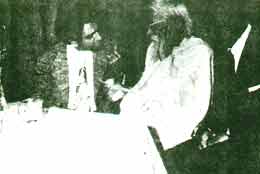
Two Great Artists - Shiv with S. Sobha Singh
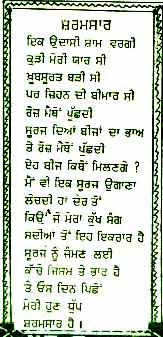
We are proud to present two articles by renowned authors who have excelled in the art of writing, namely Sant Singh Sekhon and Kartar Singh Duggal. These articles are from their book 'A History of Punjabi Literature'. Their frank assessment of Shiv is given hereunder:-
Shiv Kumar Batalvi (1936-1973)
Born in a village in the Shakargarh tehsil of the district of Sialkot (now
in Pakistan), Shiv Kumar Batalvi was brought up in Batala where his father
was an official (Kanungo) in the revenue department. After passing the matriculation
examination, he joined the Baring Union Christian College at Batala and then
Khalsa College, Kadian. But he left the second college also after about a
year and joined a school at Baijnath in Kangra district for a preliminary
course of engineering. There he fell in love with a girl Meena. Meena died
of typhoid fever and like Mohan Singh, Shiv Kumar became a victim of unending
bereavement. But whereas Mohan Singh was able to outgrow his sorrow, Shiv
Kumar kept it alive in his breast until his death.
At his father's insistence he passed a course of land and revenue accounts
and actually joined service as a Patwari. Shiv Kumar seems to have acquired
an intimate knowledge of the rural scene in a rather isolated corner of Punjab,
through his brief experience as a Patwari but it is his Brahmanical culture
that links his poetry to the urban Hindu ritual and its picturesque catholicity.
His first collection of poems was published in 1960 under the tide Piran da
paraga (The Scarf of Sorrows). Shiv Kumar's repeated disappointment in love
is poignantly reflected in these poems.
The tone is one of bereavement and despair. The most relished poem in the
collection is "Kandiali Thohar" (Thorny Cactus); Kumar compares
himself to this plant which grows in the wilderness and on which no human
care is bestowed. In this collection as in all his subsequent work, Shiv Kumar
takes sorrow to its last limit.
The next collection of poems followed in 1961 with the title 'Lajwanti' (Touch
Me Not). In these poems the poet starts from his own experience to an objective
realisation of the human situation. It has been called a pleasant combination
of tradition and experimentation. In this collection, "Garbhavati"
(A Pregnant Woman) is one of Shiv Kumar's great poems.
The next collection came in 1962 with the title Atte dian chirian (The Sparrows
of flour). In these poems, the poet's vision pierces the colourful curtain
of romance to the stark reality of life and gives an indication of his deeper
acquaintance with human grief and sorrow.
Mainu Vida Karo (Bid Me Farewell) came in 1963. In these poems the poet's lyrical power is at its height and equally pronounced are his intimations of death. It is in this collection that these immortal lines occur:
I am going to die in the season of youth,
I am going to depart without emptying my contents,
After completing a cycle of separation from you.
In 1965 was published Shiv Kumar's masterpiece, a dramatic poem, "Luna".
In this poem Shiv Kumar has taken up the legend of Puran Bhakta which has
been called an expression of a significant aspect of the Punjabi psyche. It
is the story of Puran, son of Raja Salvahan, resisting the solicitations of
his youthful stepmother Luna, who perverts the truth into a big lie and accuses
the innocent Puran of having attempted to outrage her modesty. Shiv Kumar
changes the legend to an extent, by justifying the youthful Luna's solicitation
of her stepson, because she has been married against her will to the old Raja
Salvahan. So beautifully has Shiv Kumar advocated Luna's case that beside
the iniquity of an unequal marriage, Puran's dutiful rejection of Luna's advances
appears as a cruel, ascetically insensibility. The poet has woven the tapestry
of Puran's rejection in such a way, that it remains inexplicit till the end,
whether the rejection is being presented as a compulsion of Puran's role as
an ascetic, or as a rejection of beauty and youth by a cruelly motivated social
order.
Main Te Main (I and I) published in 1970 is a long poem of seventy-five pages,
which is unique in modern Punjabi poetry in both its conception and execution.
In the introduction the poet himself writes, "The legend in this poem
is not mine, nor is its truth my truth...whatever is mine in the truth of
this legend is the truth of my being not of my person. Its psychological background
is only a phenomenon of the intellectual and moral scepticism of the present
generation. The truth of the hero of this poem is a protest against the false
and hollow moral values of today. It is the revolt of modern man's disintegrated
personality against the death of his true being." The narrator describes
his birth as the result of his mother's sexual hunger even when she is an
unmarried woman. This hunger is, according to the poet' sunk deep in the being
of every woman, who is basically an unmarried mother. What the poet actually
means by this formulation is not quite clear, except on the understanding
of the poet's own experience of the basic unmorlity of woman's desire for
man as her ravisher and her son as the culmination of her innermost sexual
urge.
Another collection of poems was published in 1971 under the tide Arti (Prayer).
The poems included in it were written between the years 1963 and 1965. Thus
they are chronologically later than both Luna. and Main Te Main.
Alvida (Farewell) was published posthumously in 1974 by the Guru Nanak Dev University, Amritsar. It contains poems not published before, and these voice more progressive and revolutionary sentiments than Shiv Kumar's earlier poems. (Sant Singh Sekhon)
Shiv Kumar's poetry is marked be the 'death-wish'.
No one may sing this song of mine
I alone will sing it
I'll sing my song
And take my leave tomorrow
No one may sing this song of mine
I alone will sing it
Shiv Batalvi recited this poem in a 'Kavidarbar' in 1963: The entire audience
was spellbound. A slim, tender, handsome youth, still in his twenties was
enchanting the audience with the agony of his melody, a lock of his hair playing
on his forehead that he tried to push back with his smoke-stained fingers.
He closed his poem with these lines:
When I and my song
Are no more tomorrow,
The lovelorn will come
Looking for us in the graveyard.
And all of them
With one voice would say,
"Very few are destined
To die like this."
There was hardly an eye that had remained dry in the audience.
It seems Shiv not only cherished the death-wish, he found fulfilment in it.
It was no sentimentality, he longed for it from the heart of his hearts and
he wanted to die young, in the prime of his youth.
I must die at the peak of my youth.
I must return in full bloom.
Having suffered pangs 6f from you separation
I must die at the peak of my youth.
He who dies at the peak of his youth
Is turned into either a flower or a star.
It's only lovers who die young
Or those who are born lucky.
The more he sang about it, the more the idea gripped him. His life was full of deep wounds. His mother died, his father died, he fell in love with Meena; she was also snatched away by the cruel hand of death. He met another girl who looked like Meena. She jilted him and went abroad. A mere Patwari, he resigned his petty job in disgust. A sensitive youth who could not study beyond matriculation, he threw himself at the mercy of the cruel world; buffeted by circumstances, his soul was bruised. Is it not a lacerated heart that sings thus?
My mother died when I was a suckling
My father when I was a baby.
My sweetheart died when I was young
My song died unsung.
I beg of you, my Lord,
Don't hold me up any more.
Let me go. .
Give me a warm tear
And bless me with pangs of separation
Let me go.
Then came a stage when he rejected himself. Such a mood in a perceptive youth,
with dreamy eyes and love-songs on his lips, can be disastrous. And a disaster
it was. Shiv started chain-smoking, drinking heavily and trying all sorts
of odd drugs. He plunged himself headlong into the misery of disillusionment.
His contemporaries, not even half as talented, were flourishing and he was
left on the streets to live in the backwaters of Batala. His starving young
wife and under-nourished children added to his agony. Shiv felt he had already
outlived his days:
My love!
What for should I live?
The soiled flesh of my face
Who will kiss or adore?
My love!
What for should I live?
Shiv Kumar's Luna remains his masterpiece and deserves a little more elaborate
notice.
The poet has identified himself with Luna. In Luna he portrays the tragedy
of the helplessness of the Indian woman who has remained at the mercy of her
men folk; maybe he is a father or a husband or a son. No more would she be
the helpless witness of injustice inflicted on her. She is determined to revolt
If Salwan the king, who is as old as Luna's father, can marry her, a teenager,
why on earth cannot she fall in love with Puran who is of her own age? What
if he is her stepson? Says Luna:
When a father shares his daughter's youth
And no one is outraged
Why should the people's tongue
Wag at her
When Luna falls in love with Puran?
Luna is no more the quiet, submissive, self-effacing Hindu woman. She resists
her marriage to a man many times her age against her wishes. She rejects his
high caste, his wealth, his status and his palaces. She would rather be happy
with a young man of her own age, no matter if he is not well to do:
I am an untouchable
Give me an untouchable husband,
Take away these flowers
And give me a handful of thorns.
Snatch away the mansions
And give me a humble hut
I am the brick of a wall
Restore me to my place.
But it was the man's world in which tuna saw the light of day. No protest avails her. No arguments. No reasoning. Her friend counsels her:
Some fit
And some do not fit
We are the footwear of the menfolk.
And she is married against her wishes to a man who has a son as old as Luna. "I am only a kiss older than him" says Luna. She cannot persuade herself to be his mother. Moreover, his mother was still living, a gentle, pious lady who had been callously passed over. Luna refused to take her place. She would rather have Puran as her lover than as her son. But it is no easy decision. It is a revolt against her times. It is, perhaps, a revolt against nature. It is, indeed, a difficult decision. Luna is miserable. She suffers the pangs of conscience:
Every hour
The serpent of fiery moments
Dances in the inner cells of my soul
And the demon of fear haunts me.
I sit and spin the wheel of time,
I spin the rays of the sun,
And wind them into a rope
And I hang this rope
From the roof of my years
And every day I die
With this multicoloured noose around my neck
And yet I die not.
It. was certainly no easy decision for Luna to take, falling in love with
one whom society gave her as her son. But she took decision. It was frightfully
bold of her. She had to through fire.
How she suffered! At one stage, it appears, it was no more an emotional involvement,
it was a cold, calculated decision, a premeditated strategy, as it were:
I have smeared his piety
With ugly charges,
These charges, in due course,
Will blossom into flowers
Which will bloom for years and years.
On this earth
When people will assemble anywhere
When people will sit anywhere
They will talk about Puran
The unblemished one.
And it seems there is a lot of truth in it Luna is not deceiving herself. She might have filled in seducing Puran, but she eventually, succeeded in winning him over to her point of view. He starts sympathising with her. In this lies Luna's victory. Puran is prepared to die, so that no Luna is ever exploited. It appears to be a sort of vicarious suffering:
Slice away my limbs
So that no SaIwahan, in future,
No father, in future
May share the youth of his daughter.
So that everyone
Marries in his own age group,
So that never again a Luna
Longs for a man other than her husband,
And never again the youth of a Luna Is wasted away.
Puran goes a step further. He condones Luna completely. He rationalises her actions and viewing the entire tragedy from a higher level confirms:
There is no sinner here
Nor is there any saint;
It is the helplessness of circumstances
This helplessness is named sin.
It is exactly at this spiritual level where Luna also finds herself in the
end:
From today, for Luna
There is no good, no evil
Nor day nor night
Every right is perhaps wrong
Every wrong is perhaps right.
It is at this stage that Shiv passed away.(Kartar Singh Duggal)
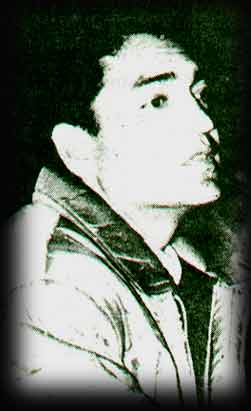
I met Shiv Kumar a number of times during his stay in Britain and I was more than sorry to learn of his death. My sympathies and best wishes go out to his widow and his children. I shall remember his friendliness and his eagerness to learn as much as he could about the state of poetry in Britain. But I shall never forget his performances. I have seen many hundreds of poets perform but I don't think that I have ever witnessed such displays of intensity and passion. I knew I was close to a genius.---Spencer Leigh
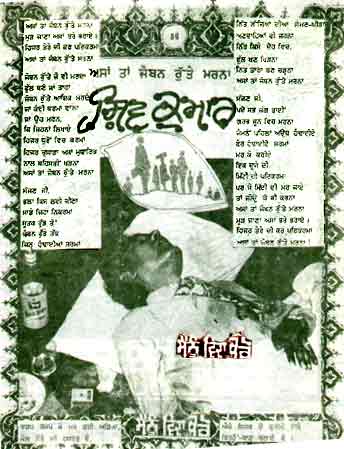
THE END OR BEGINNING OF SHIV?
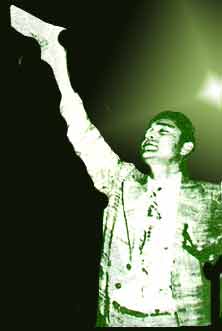
ijQy ieqrW dy vgdy ny co nI
auQy myrw Xwr vsdw
ijQoN lMGdIAW pOx vI Klo
nI auQy myrw Xwr vsdw [
My Love Lives There
My love lives there where
The streams of scent flow
No matter what season
There is a continuos fall of snow.
Morns creep into this region
Bare-footed and make no sound
The nights adore their feet
With the henna of sweet rays.
The fragrance bathes in the moonlight
That's where my love resides.
I have no idea as to
How long I have to live
In this agonising separation
I might gulp down a drought
Of my love in my dream
Oh, No! I have turned into
A mad lover-forgive me
My Lord, I won't commit such a sin any more.
From His Ghazalgoi
I long to die young,
There is an abode for youth after death
To conceal my agony
Under the garb of
Sweet and serene lyrics
Sorrowful and miserable verses.
I have been engaged in
Lighting the lamps of existence
Feeding it with my tears and torments
I have eaten nine and quarter
